Index relies entirely on the support of donors and readers to do its work.
Help us keep amplifying censored voices today.
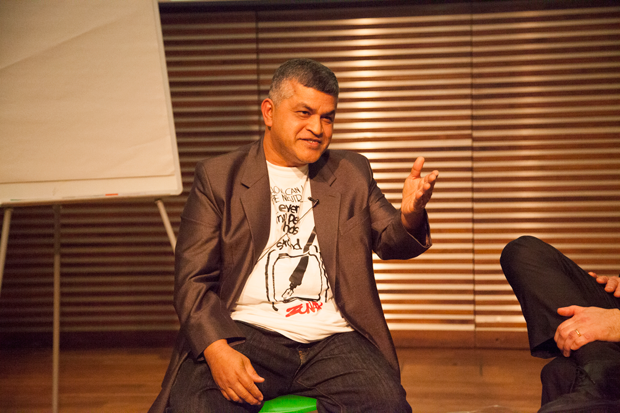
Malaysian cartoonist Zunar is facing charges under a colonial era sedition act. (Photo: Sean Gallagher/Index on Censorship)
“The one thing the powerful cannot stand is laughter,” said British cartoonist Martin Rowson, speaking at an event with persecuted Malaysian cartoonist Zunar in London last night.
Citing the story of the emperor’s new clothes, and the revolutionary potential of the little boy who laughs out loud at what he sees, Rowson said he felt “very humbled” to be talking to a fellow cartoonist who could soon be condemned by his own government to spend the rest of his life in prison.
Zulkiflee Anwar Haque, aka Zunar, is currently facing a record number of nine simultaneous charges under Malaysia’s sedition act in a trial that is scheduled to begin on 20 May.
Originally enacted by British authorities in 1948, the sedition act is an old piece of colonial legislation which is being used to silence opponents and suppress free speech in a country where the ruling party has not changed in 57 years.
“Maybe here you have a government,” Zunar told a packed house at London’s Free Word Centre, “in Malaysia we have a regime… a cartoon government”.
Visiting London a week before his trial is due to open, 53-year-old Zunar remained upbeat despite the possibility of his spending up to 43 years behind bars.
Zunar took the opportunity to launch his recent book of cartoons, Ros in Kankong Land. Poking fun at Rosmah Mansor, the powerful wife of Malaysian PM Najib Razak, the book has been repeatedly barred from being launched officially in Malaysia.
With five of his books already banned for containing cartoons deemed “detrimental to public order”, his Kuala Lumpur office repeatedly raided, and publishers and bookstores across his country warned off printing or carrying any of his titles, censorship is an everyday challenge for Zunar.
Why carry on? Because he “wants to tell Malaysians that you are the ones who suffer from corruption”, ending the evening by drawing a cartoon depicting his fellow countrymen, propping up their regime and suffering painfully under the weight of their rulers.
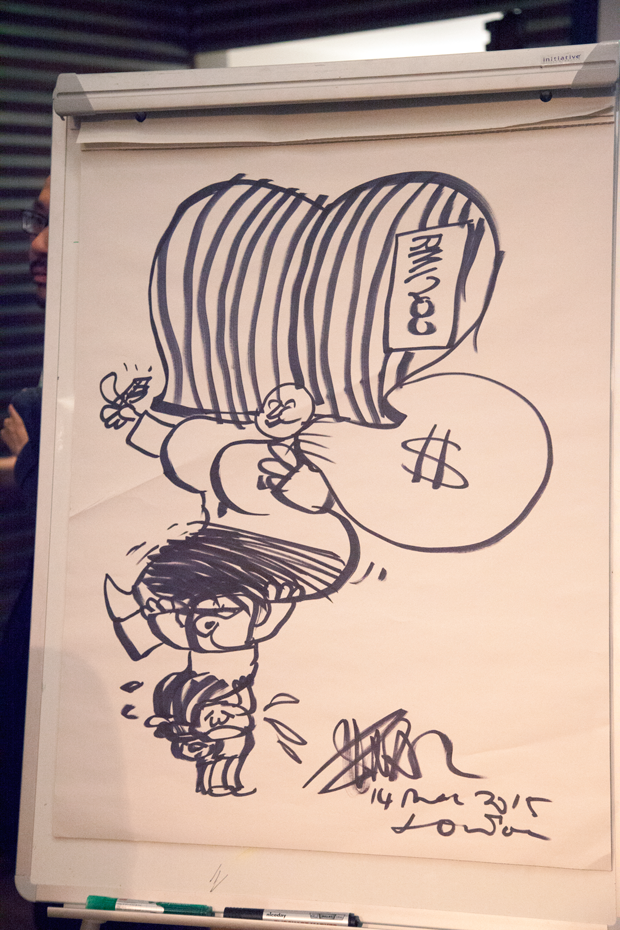
“Talent is not a gift. It’s a responsibility,” said Zunar, underlining his intention to “draw until my last drop of ink” and inviting “you all to join me in fighting this government”.
Discussing the power of cartoons to cut across divides universally, Rowson added an interesting perspective, telling the audience he had come to think his “purpose is not to shame politicians into resignation” but “to empower people to laugh at them”.
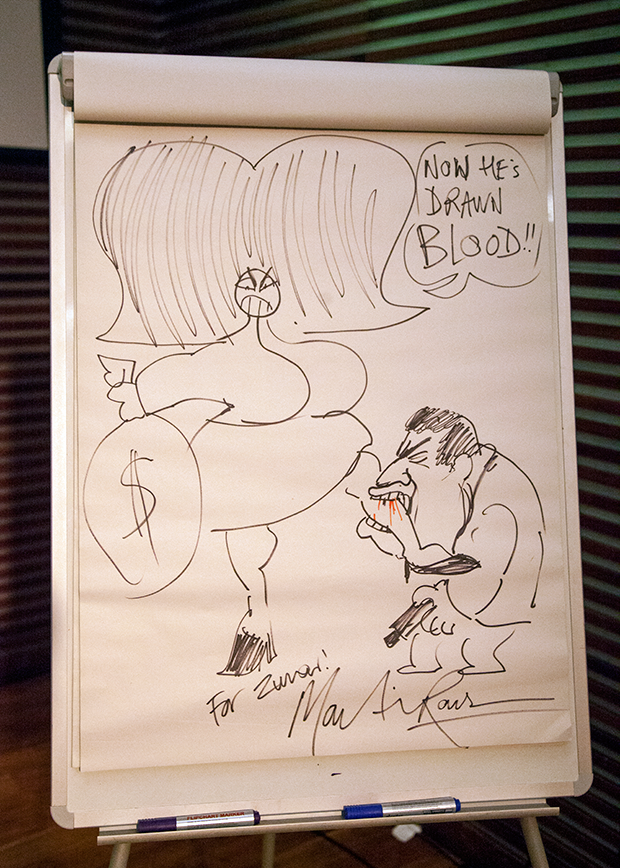
“I am a satirist and a cartoonist because I am offended,” offered Rowson, reflecting on whether there are any limits for cartoonists. “Why pinch when you can punch?” said Zunar, suggesting people mix up moral right and artistic right. “I saw cartoons of the prophet Muhammad and I didn’t like them all…”, but “if he was alive today, Prophet Muhammad wouldn’t have ordered cartoonists killed”.
How you can help Zunar
Zunar was visiting London to raise awareness of the situation for him and his peers. To call on the Malaysian government to drop all charges and renew its commitment to freedom of expression, you can sign this petition.
You can also buy Zunar’s latest book Ros in Kangkong Land at his website.
This article was posted on 15 May 2015 at indexoncensorship.org
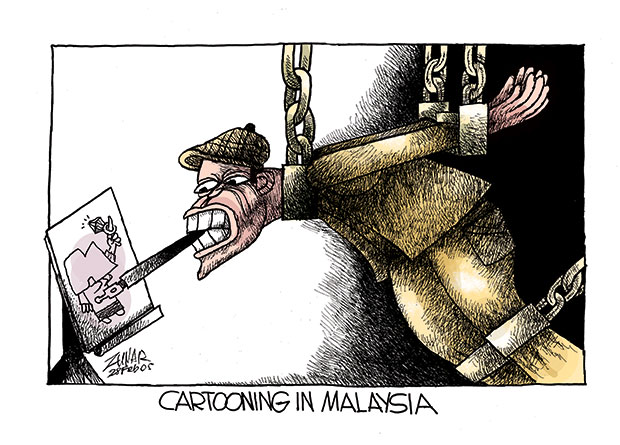 Malaysian cartoonist Zunar is currently facing 9 charges under the country’s sedition act, with a maximum penalty of 43 years imprisonment. Five of his books have already been banned, containing cartoons deemed “detrimental to public order”. Since 2009, his Kuala Lumpur office has repeatedly been raided, thousands of his cartoons confiscated and publishers and bookstores warned off printing or carrying any of his titles.
Malaysian cartoonist Zunar is currently facing 9 charges under the country’s sedition act, with a maximum penalty of 43 years imprisonment. Five of his books have already been banned, containing cartoons deemed “detrimental to public order”. Since 2009, his Kuala Lumpur office has repeatedly been raided, thousands of his cartoons confiscated and publishers and bookstores warned off printing or carrying any of his titles.
In a year when cartoons have rarely been far from the headlines, join us for an evening with an award-winning satirist who says “I will keep drawing until the last drop of my ink”.
One week before his trial in Malaysia, Zunar will be joined by political cartoonist Martin Rowson to share his story through words and pictures.
Where: Free Word Centre, London
When: Thursday 14 May 2015, 7.30pm
Tickets: Limited, booking essential – Book here
Related: Drawing pressure: Cartoons from around the world
Presented in partnership with Article 19 and supported by Free Word
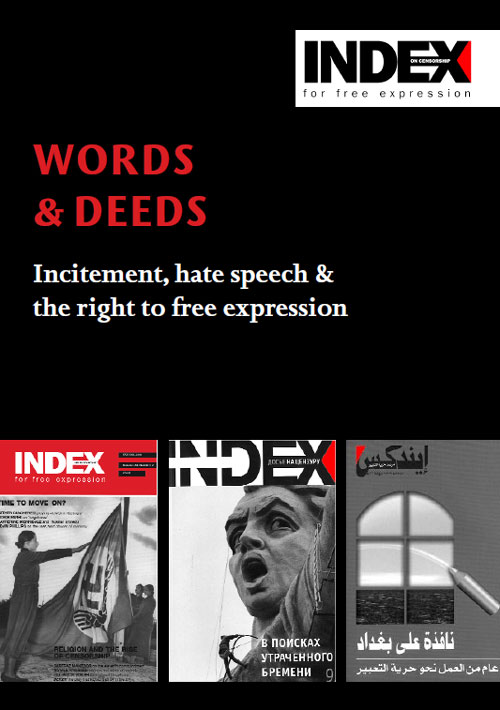
Download the full PDF of Words and Deeds: Incitement, hate speech and the right to free expression. First published December 2005, Revised 2006
This collection was prepared for the EU NGO Forum that took place on 8-9 December 2005 and revised in 2006.
At the end of the Maastricht summit in l992, the Council of Ministers reported on what they saw as a paradox of history: that racism had increased as democracy had spread through the post-communist world. Not such a paradox really. As Hans Magnus Enzensburger once said:‘With democracy, all the dirt comes out.’
Index believes that free expression is the freedom on which all others are based. Ronald Dworkin famously said in its pages that free speech is what makes people feel human, makes them feel their lives matter. But we also need to be clear about our fierce defence of free expression – that there are prices to be paid for it – and we need to be clear about the cost, and who is paying it.
Hate speech – abusive, dehumanising, inciting discrimination and violence – is an integral part of the ‘dirt’ that goes with democracy, often directed at ethnic minorities, gays or women. It is certainly the most troubling matter for people who believe in free speech, and there has been fierce debate over the years about that difficult borderline between free speech and the demand for equality of respect – not least in the pages of Index on Censorship over its 33 years of existence.
But then, on 11 September 2001, the world changed, and hate speech acquired another, newer relevance. The ‘war on terrorism’ (a war that may never end, according to US Vice President Dick Cheney) put civil liberties under threat worldwide. And since then the right to free expression has too often become a fragile filling, sandwiched between the imperatives of security and fears about acts of terrorism. In these dangerous times, hate speech is centre stage, and the ways in which we respond to it are crucial to our future.
The importance of free expression is as great as ever, as is the need to debate openly difficult issues – ones which may cause pain, offence, anger. Nobody ever said free expression was easy. Index’s purpose is to do its small part in creating a world in which the right to speak for oneself becomes the condition for allowing those who speak antagonistic moral languages to hear each other. We hope Words & Deeds will play its part.
Ursula Owen
former Editor in Chief, Index on Censorship
December 2005
With essays and contributions by:
RONALD DWORKIN A new map of censorship
TOM STOPPARD Is there ever a time & place for censorship?
ARYEH NEIER Clear & present danger
VALERIU NICOLAE Words that kill
REMZI LANI Hate speech & hate silence
OLEG PANFILOV The rebirth of nationalism
HANEEN ZOUBI Follow the tune, relay the message
JONATHAN FREEDLAND Where the lines are drawn
MARTIN ROWSON A classic Stripsearch cartoon from Index on Censorship
SARFRAZ MANZOOR Thou shalt not give offence
KENAN MALIK Are Muslims hated in Britain?
AGNÈS CALLAMARD Striking the right balance
ANTHONY HUDSON Free speech & bad laws – what can be done?
AMIR BUTLER Warning from Australia: don’t legislate against hate
MARY KENNY When speech became treason
PAUL OPPENHEIMER In the name of democracy
DD GUTTENPLAN Should freedom of speech extend to Holocaust denial?
AIDAN WHITE Journalism & intolerance: setting standards for media action
RONALD KOVEN Put your own house in order first
RICHARD SAMBROOK Think what you say
KENAN MALIK Say what you think
When Turkish political cartoonist Musa Kart faced nine years in prison for “insulting” President Recep Tayyip Erdogan, his colleagues from across the world fought back in the best way they know how — by drawing their own #erdogancaricature.
The online campaign was started on Thursday by Martin Rowson, cartoonist for The Guardian, The Independent and Index on Censorship among others, as Kart was scheduled to appear in court.
Erdogan himself filed the complaint against Kart over a cartoon published in the daily Cumhuriyet on 1 February 2014 showing the then prime minister as a hologram watching over a robbery. This was a reference to his alleged involvement covering up a high-profile graft scandal.
Erdogan claimed Kart was guilty of “insulting through publication and slander,” reports Today Zaman. And while the court initially ruled that there were no legal grounds for action, this decision was revoked following complaints from Erdogan’s lawyer. Kart was also fined in 2005 for drawing Erdogan as a cat.
In court on Thursday, Kart stated: “Yes, I drew it [the cartoon] but I did not mean to insult. I just wanted to show the facts. Indeed, I think that we are inside a cartoon right now. Because I am in the suspect’s seat while charges were dropped against all the suspects [involved in two major graft scandals]. I need to say that this is funny.”
He was finally acquitted, but many of his fellow cartoonists has already shared their artistic interpretations of Erdogan and the case.
“I was alerted to Musa Kart’s plight by the excellent Cartoonists’ Rights Network International (CRNI) and previously, when an Iranian cartoonist was sentenced to 40 lashes, a bunch of us got together to draw the offended politician who’d had him arrested, the sentence was commuted,” Martin Rowson told Index via email.
“It seems this kind of international bullying by cartoon does have an effect, as even the chippiest despot out there can usually detect a batsqueak of the shamefulness of not being able to take a joke. In Musa Kart’s case, the threat of up to nine years in prison was such an outrageous abuse of power I didn’t wait for anyone else to organise this and simply put out a call via Twitter for cartoons of Erdogan to show solidarity. No idea if it had any effect on the court (I doubt it) though it may put Erdogan off the idea of taking the case to a higher court. I hope so. And I hope it gave Musa Kart a feeling that he wasn’t on his own in there. Basically, this is cartoonists playing the Spartacus card, because if one of us, anywhere, is persecuted for laughing at power, we all are,” said Rowson.
“Cartoonists are often the last bastion of free speech in repressive regimes and equally valued for telling the truth as it is, in democratic societies too; some consider their work to be of just as much value, if not more, as journalists, and many respected for the courage and ability to often say and report what others cannot, or fear to do, alongside the just as valued use of satire to reveal a truth which otherwise might not see the light of day,” Patricia Bargh from CRNI explained to Index in an email.
“Thus as societies we should value and protect their right to do what they do, and if they know there is an organisation out there who will take up their case, should they be targeted, we hope that gives them the confidence to continue to on and assists them in their valuable work too,” Bargh added.
This article was originally posted on 20 October at indexoncensorship.org